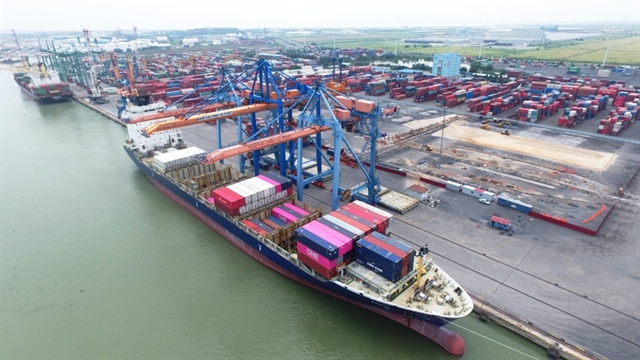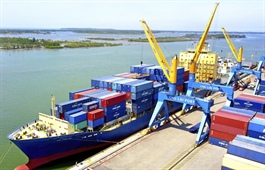Vietnam trade turnover to hit all-time high of $645 billion in 2021
Vietnam trade turnover to hit all-time high of $645 billion in 2021
Free trade agreements like CPTPP and EVFTA are driving Vietnam’s trading performance during a difficult economic year.
Vietnam’s trade turnover in 2021 is expected to hit an all-time high of US$640-645 billion this year, despite the severe economic impacts from the Covid-19 pandemic.

Cargos handling at Haiphong port. Photo: Cong Hung |
Statistics from the Import-Export Department under the Ministry of Industry and Trade (MoIT) revealed the country’s trade turnover in the first 10 months of 2021 was estimated at $537.31 billion, of which exports amounted to $267.93 billion, up 16.6%, and imports of $269.38 billion, or an increase of 28.2%.
Vietnam recorded a trade deficit of $1.45 billion as of October, however, such figures could be narrowed as the resumption of economic activities have been a major boost for exports, which would speed up in the remaining period of the year to meet growing demands from international markets during the year-end shopping periods.
“Vietnam’s trade revenue may stay in a range of $640-645 billion, with the trade balance turning to a surplus side,” noted Deputy Director of MoIT’s Import-Export Department Tran Thanh Hai.
“This would be a huge achievement, especially taking into consideration the fourth Covid-19 outbreak that has forced major industrial hubs in both the North and South of Vietnam into lockdown,” he added.
Hai referred to similar sentiments from several business associations which forecast stronger export growth of 15-25% year-on-year for Vietnam’s export staples this year, such as garment, footwear, and electronics.
According to Hai, free trade agreements, especially the CPTPP and EVFTA, were the key driver for Vietnam’s exports. In the case of the CPTPP, the country’s exports to Canada, Mexico and Peru witnessed sharp rises of 25-30% per year.
“In the EU market, Vietnamese goods and products mainly benefited from the EU’s unilateral trade preferences of Generalized Scheme of Preferences (GSP) in the past. The scheme, however, remains a short-term solution and would be phased out based on the beneficiary’s level of economic development. The EVFTA, in this regard, is a bilateral trade deal with long-term benefits,” Hai said.
Hai noted the biggest challenge for the last two months of 2021 for businesses is a labor shortage.
“Meanwhile, the Covid-19 impacts have resulted in higher logistics and input material costs,” he said, adding this would put more pressure on enterprises.
Hai also expressed concern over the ongoing infections in a number of provinces/cities that are forcing local authorities to adopt restriction measures.
“Such moves could unsettle businesses if localities are not fully complying with the Government’s Resolution No.128 on flexible and safe adaptation to the pandemic,” he added.
“Overreacting to the situation may negatively affect the confidence of investors in Vietnam’s business environment,” Hai warned.
|
Vu Duc Giang, president of the Vietnam Textile and Apparel Association (VITAS) in a recent conference on November 15 noted the country’s garment industry exports stood at $32 billion during the 10-month period, up 11% year-on-year. “This put the industry in a favorable position to achieve an export target of $38-38.5 billion for this year, higher than the $36 billion recorded in the same period of last year,” he said. |
|
General Secretary of the Vietnam Fruit and Vegetable Association (VinaFruit) Dang Phuc Nguyen noted while the Covid-19 pandemic has caused difficulties to vegetable and fruit exports, there has been a significant rise in export growth to markets in Europe, Southeast Asia, or the Middle East. With an agricultural export turnover of $38.7 billion in the first 10 months of 2021, up 13.1% year-on-year, the $44-billion target for this year is within reach. |


















